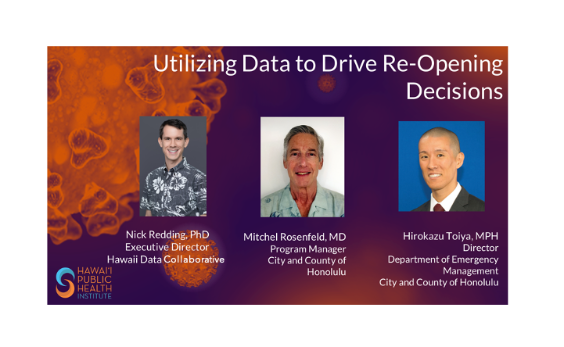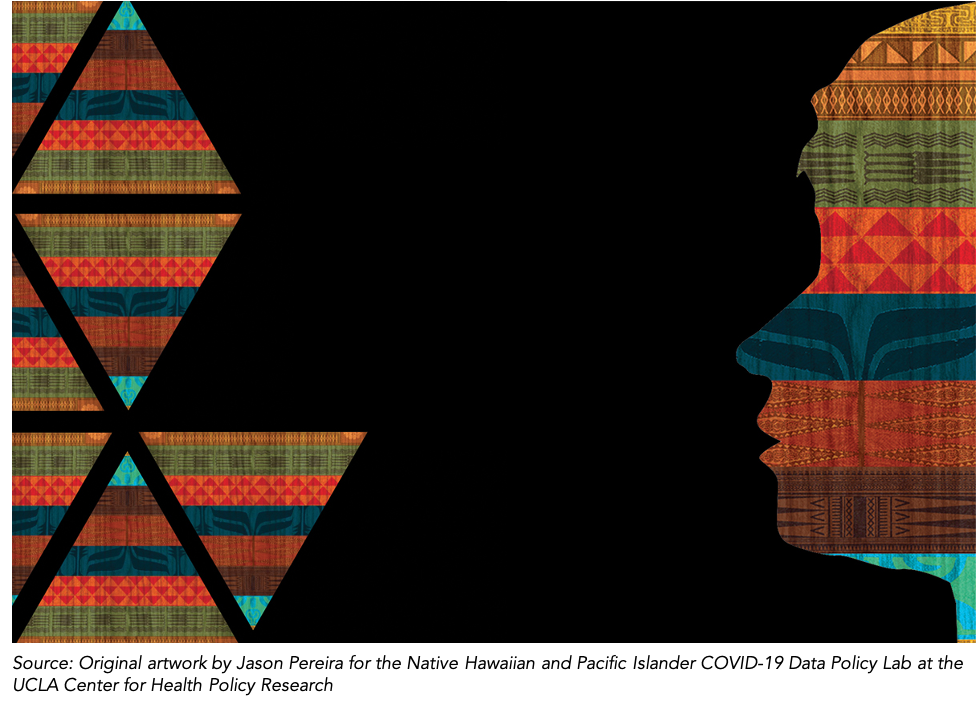News & Updates

Employment Opportunity with the Hawai‘i Data Collaborative: CHANGE Research Specialist
This position will support a partnership between the Hawai‘i Data Collaborative and the Hawai‘i Community Foundation to compile existing data sources and develop new data sources relevant to the CHANGE Framework.

How to Make the Most of Our Federal Relief Funds
It is often said that our values are reflected in what we budget, what we spend our money on. The COVID-19 pandemic has been the ultimate test of that well-known adage. With overwhelming need in every corner of our communities and each sector of our economy, there was no shortage of what to fund — but with so little time, the challenge was how to get the funds out quickly to those who needed them most.

A Report on Hawai‘i’s Data & Evidence Landscape
We are excited to share a report that summarizes what the Hawai‘i Data Collaborative has learned directly, and indirectly through interviews with key stakeholders, about the the data landscape in Hawai‘i, offering a guide to moving forward. Our sincere hope is that this report catalyzes the collective and collaborative effort needed to foster a thriving data culture, ready to confront the challenges of 2021 and beyond.

Behind the Data Scenes: Partnering to Build a Robust 211 Data Resource
Shortly after the first case of coronavirus in Hawai‘i was confirmed, and residents were unsure how public health mitigation efforts to limit the spread would impact our local economy, our team focused on addressing the need for timely data in order to understand how households would be impacted and what support they would need.
Aloha United Way’s (AUW) 211 Helpline appeared to be a good place for us to start. AUW welcomed us to peer behind the curtain and gain a better understanding of the 211 system. What we observed was a system containing several fragmented components, fraught with unreliable data flows and prone to human error, immediately raising data integrity concerns. Though we started with an interest in 211 data as a timely data source, if the system supporting the data wasn’t reliable, then how reliable and useful would the data itself be? It was clear that the first challenge to address was upgrading the 211 system.

TRUE Insight: Tableau Success Stories in Hawai‘i
Insight from data has made an impactful difference in Hawai‘i’s response to COVID.
On January 27, 2021, Deena Tearney, CEO of Pacific Point, moderated a panel that discussed how:
Successful response requires everyone to come together and rapidly innovate in times of crisis
Data, data visualizations, and data integration with other system increases decision making value
You can create and foster a data culture at your organization
Panelists included Jeremy Blaney of Tableau; Erin Hughey of Pacific Disaster Center; and Nick Redding of the Hawai‘i Data Collaborative.

The Hawai‘i Variable: COVID-19 Dashboards Workshop
On January 21, 2021, Civil Beat's data reporter, Yoohyun Jung moderated a panel of experts as they explored Hawai‘i's COVID-19 data dashboards during an in-depth workshop and discussion.
Panelists included:
Nick Redding, Hawai‘i Data Collaborative
Joshua Quint, Hawai‘i Department of Health, Disease Outbreak Control Division (DOCD)
Niea Gardner, Hawai‘i Emergency Management Agency (HIEMA)
Victoria Fan, University of Hawai‘i at Manoa and Hawai‘i Pandemic Applied Modeling Work Group (HiPAM)
Panelists demonstrated how to navigate Hawai‘i’s many COVID-19 data dashboards and figure out how to extract the most important, and interesting, information out of them.

Tracking the Coronavirus and the Federal Funding
In Hawai‘i Magazine’s “Hawai‘i Gives Back” Series, Hawai‘i Data Collaborative’s (HDC) Nick Redding is featured in “Tracking the Coronavirus and the Federal Funding” contributed by Hawai‘i Community Foundation, where he discussed:
Why HDC works to make data accessible;
How COVID created a shock to the system that has helped people see the value in data;
What we should be doing now to prepare for the next disruption.

It Takes You and the System: From Data-Driven Mindset to Data-Driven Culture
As we think about ourselves using a data-driven mindset at work, it is important to note that our environment—in particular, our organizations—shape our effectiveness in being able to truly leverage this mindset. Imagine an organization where leaders believe the best decisions are rooted in data and so they model data-driven decision-making every chance they get. They challenge their teams to support ideas with data. Embedded in the organization is the belief that data is incredibly valuable and so, accessibility to data is prioritized through processes, technology, and infrastructure. Even more, the organization recognizes that if it expects everyone to make data-driven decisions, it must build data literacy skills through trainings and workshops so that employees feel competent and empowered to use data to tell stories, solve problems, and make decisions. Intriguing, right?

It’s the Journey, and the Destination: The Never-Ending Data Story
In the not-so-ideal scenario where your data doesn’t support your hunch, do you stop there? You might, but there is a lot of learning that comes from results you do not expect. You may challenge yourself and ask: are my assumptions about this problem flawed? What else have I learned along the way? What factors might I have overlooked?
We recognize that taking time to examine your results in the context of your research question, and broader research problem, is not always possible for leaders who need to make urgent decisions. However, the key is to lean into the ambiguity and understand that regardless of the result of an analysis, leveraging data to make decisions is an ongoing process. At each critical point—including the moment from examining assumptions, evaluating data, and interpreting results—there are opportunities to pause and get ‘feedback’ about how we understand the problem and the factors we perceive to be relevant (e.g. the data source, the data itself).

Hawai‘i Economics and Economists In the Spotlight
In Hawaii Business Magazine’s December 2020 issue, Hawai‘i Data Collaborative’s Nick Redding and Kendrick Leong were featured in “Hawai‘i Economics and Economists in the Spotlight” by Sterling Higa, where they discuss how HDC first began as a project intended to produce an index of well-being for Hawai‘i, how the learnings from the project expanded HDC’s work to include unlocking the potential of publicly available data to support better decision-making, vulnerabilities in the state’s data culture that the COVID-19 pandemic brought to bear, and why we must be thoughtful with the economic indicators we focus on as it relates to how we define “economic recovery” (as discussed in a previous post).

Not All Are Created Equal: Evaluating Data Quality
When working to answer a research question or add support to our intuition, it is necessary to assess the quality of our data. Poor data often can be worse than no data, leading to flawed interpretations and misinformed decisions. An important disclaimer here is that most data has flaws and thus limitations. The key is to consider the data in the context of our question (hence why critiquing our assumptions and understanding the full picture of the broader problem is so important) while also weighing the flaws. By doing this, we are able to better anticipate the utility and limitations of the conclusions we draw from the data. In order to evaluate data quality, consider the following characteristics…

Rethinking Your Thinking: Overcoming Biases With a Data-Driven Mindset
As we’ve discussed so far in this series, intuition is important for leaders, especially in a world where information is vast, problems are complex, and decisions need to be made quickly. While it is probably easier and faster to rely on intuition, doing so can introduce biases which can erode decision quality over time.
A data-driven mindset—one that honors intuition while offering a structured method for testing it—can be a practical way to reduce biases in our decision making. It is worth mentioning that it would be misleading to suggest that data alone solves the problem of bias. In fact, a lot of data are subject to bias. This is why we value an integrated approach that leverages intuition as a starting point and bolsters its impact on decisions with data.

Yin and Yang: Intuition + Data-Driven Mindset
In our Data for Good Decisions series, we conceptualize a ‘data-driven mindset’ as a systematic process for integrating metrics and other forms of data to test assumptions formed through our intuition. Approaching challenges with a data-driven mindset is considered a competitive advantage for leaders because it enables swift identification of business challenges and action before it’s too late. By adopting this mindset, we are actively working to minimize the influence of biases (although, it is worth mentioning that we can never be free of them). Now more than ever with unlimited data at our fingertips, adopting a data-driven mindset can help us become knowledgeable data consumers able to draw meaningful conclusions and make important decisions.

Check Your Gut: Intuition and Its Limitations
Mental shortcuts are valuable because it would be incredibly demanding, almost paralyzing, to process every piece of information – significant or trivial – in order to make a decision. Our use of mental shortcuts presents a double-edged sword to intuitive decision making. On the one hand, we need these mental shortcuts to navigate decisions efficiently when we cannot possibly have all the information. On the other hand, relying too much on unconscious processes leaves us prone to biases in the important decisions we are undertaking. As leaders, we all have probably used intuition to make some important decisions. If we know that intuition is subject to bias then we may ask ourselves, how can we leverage our intuition while ‘guarding’ against biases?

Census 2020? Check one: ☐Yes ☐No
Every ten years during the Census, a large percentage of the United States’ population does not respond to the Census. Despite this, the Census Bureau must count all individuals, whether or not they respond. Studies have shown that lower self-response rates are correlated with less accurate results, and the accuracy of the Census is not the same for all groups. Early identification of these individuals is important to focus efforts during the Census, but Census 2020 has been especially challenging given recent events. Many communities in Hawaii responded at a rate lower than what one might expect in a “normal” census year, meaning that this census will have missed some of the more marginalized in our communities. When a group of individuals is not represented in the Census, they are not represented in our system of government. The communities in which they live do not receive needed funding for important social support programs, and the very existence of these individuals may not even be known. All of this results in the marginalization of individuals who are already living on the margins.

HiPHI's COVID-19 Public Health Action Webinar: Utilizing Data to Drive Re-Opening Decisions
Hawaii Data Collaborative’s Executive Director, Nick Redding, joined the Hawaii Public Health Institute (HiPHI) and other panelists to discuss how COVID-19 data is informing the City and County of Honolulu’s re-opening strategy, tier system, and other related policy decisions. Some of the main points Nick highlighted were Hawaii Data Collaborative’s mission to elevate critical data to address Hawaii’s most pressing challenges; how the coronavirus pandemic amplified the urgency of that mission; and, some of the collaborative efforts that emerged to support the state’s response. Moderating the discussion was Stephanie Moir, from the HiPHI team; other panelists included Dr. Mitchel Rosenfeld, Program Manager with the City and County of Honolulu, and Hirokazu Toiya, Director of the City and County of Honolulu’s Department of Emergency Management.

“We Don’t Feel ‘Poor’”: How Vibrant Hawaii’s Lived Experience Data Is Shaping Community Understanding and Decisions
Following a deep study of the Hawaii ALICE report, community members across the Big Island were initially struck by what the data showed about Hawaii County: a staggering 61 percent of the county’s households were categorized as struggling to meet basic needs. In some county districts, more than three-fourths of households were labeled as struggling.
Through a series of listening sessions across the island, Vibrant Hawaii’s leadership council met with more than 30 cross-sector leaders and 90 stakeholders, both to share the report’s findings, and to learn about people’s experiences living within ALICE communities. What they heard surprised them. Many community members in attendance expressed that they didn’t, in fact, feel “poor,” despite the ALICE reports findings. In particular, three key conditions countered residents’ perceptions of being poor or struggling…

The Hawaii Variable: A Data-Based Discussion About the Economy
Hawaii Data Collaborative’s Research Specialist, Kendrick Leong, joined Honolulu Civil Beat on a panel for a data-based discussion around the impacts of COVID-19 to Hawaii’s economy. Some of the main points Kendrick highlighted were the difficulty in finding county and sub-county data to aid decision making on neighbor islands; examining economic indicators in the context of COVID data; reiterating that economic recovery is value-laden; and, identifying groups that may be left out of federal aid spending.
Moderating the discussion was Yoohyun Jung, data reporter for Honolulu Civil Beat; other panelists included Dr. Carl Bonham, Executive Director of the University of Hawaii Economic Research Organization (UHERO), and Dr. Peter Fuleky, Research Economist at UHERO.

Census 2020 +/- 2: Census, Differential Privacy, and the Future of Data
With the development of new statistical techniques, computing technology, and increasing availability of data, data accuracy presents a new challenge—privacy—that is in direct opposition with the goals of accuracy. Throughout its history, the Census Bureau (or those authorized to carry out its mandate) has essayed to collect and report accurate data; meanwhile the call to protect the privacy of respondents has grown. The opposing goals of accuracy and privacy have led the Census toward a new disclosure avoidance method—differential privacy—that aims to protect privacy and provide reasonably accurate data to users. This change signals a new phase of disclosure avoidance and data reporting at the U.S. Census Bureau. Indeed, this may be the beginning of a new world of privatized data in general.

New Platform Provides Much-Needed Data on COVID-19 Impacts Among Native Hawaiians and Pacific Islanders
Last month, the UCLA Center for Health Policy Research unveiled its Native Hawaiian and Pacific Islander COVID-19 Data Policy Lab and corresponding NHPI COVID-19 Data Policy Lab Dashboard in an effort to address the dearth of information regarding the disease’s impact on these groups. Why is the launch of the Lab significant for NHPI researchers, and what can decision- and policy makers learn from the data the Lab makes available? We explore a few answers…
